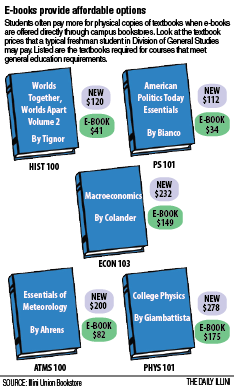University eText platforms, open-source textbooks lower cost of learning
January 28, 2015
With the rising cost of textbooks, which can cost hundreds of dollars every semester, more students are turning to e-books.
Milind Basole, principal eLearning professional at CITES, serves as a manager of the University’s textbook platform project. EText is a reading platform developed on campus, based off an Internet browser, for e-books and multimedia.
In the fall of 2014, a little over 2,500 students used the eText system, Basole said. When combining the fall and spring semesters, students saved over $100,000 by using eText over print textbooks. Certain courses, such as ACES 101 and Engineering 100 currently allow students to use the eText platform.
“Online textbooks have a lot more interactivity that can be utilized for better teaching and learning outcomes,” Basole said. “This is also a really great medium for flipped classrooms, because you have the ability to make the teaching materials available to students beforehand.”
According to the American Association of Publishers, e-book sales have increased by 7.5 percent in 2014, producing $937 million.
Get The Daily Illini in your inbox!
Basole said that with a physical textbooks, students have to “lug” the book everywhere. However, eText, a browser-based program, allows students to use the book on smartphones, tablets, laptops and adaptive devices.
Basole believes eText is on the forefront of providing textbooks for those with learning disabilities, such as visual impairment.
“We have been commended by the National Federation of the Blind for our work,” Basole said. “Adaptive devices used by people with visual impairments work with the eText platform.”
As an office administrator for the Urban and Regional Planning department, Holly Clingan is required to provide the Illini Union Bookstore with a list of textbooks professors want to order. This year, she found several publishers would only provide electronic copies of the books selected.
“There are a lot more PDF files being used as resources in the Urban and Regional Planning department,” Clingan said. “I think the program is trending in an electronic direction.”
Clingan also believes e-books are increasing due to the age of users.
“The students who are new to the program are used to digital resources,” she said. “However, I prefer paper and the ability to highlight in physical books.”
Open-source textbooks are also rising in popularity. Open-source textbooks can be downloaded by anyone, anywhere for free. Students who want a physical copy can download the book and print it.
“Instead of paying $100 for a textbook that has royalties attached to it that go to an author and a publisher, printing is around twenty dollars,” said Jonathan Tomkin, professor and associate director of the Earth, Society and Environment department. However, prices to print vary depending on the book.
The open source textbook “Sustainability: A Comprehensive Foundation” was written by a group of professors, including Tomkin, who teach at all three Illinois campuses. The textbook is currently used in Earth Systems 200 and was created with the help of a grant from Sen. Dick Durbin’s office.
“I think it may depend on the student whether online textbooks or a physical copy works better,” Tomkin said. “The benefit to the online textbook is something like a search function, which is really useful to students when looking for a particular concept.”
Due to the accessibility of open-source textbooks, Tomkin said the books are available to anyone in the world, which can benefit international students who with an e-book wouldn’t have to worry about shipping from the United States.
“One of the things that really motivated me to do this is that when a professor chooses a textbook, they choose the textbook that will best help a student learn,” Tomkin said. “With open-source textbooks, you as a professor do not have to feel guilty for putting students under a financial hardship to assign a book.”
Elyssa can be reached at [email protected].







